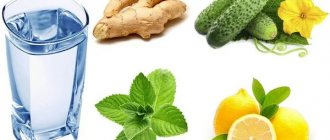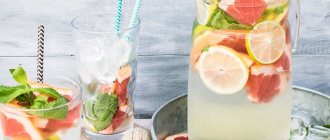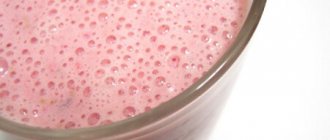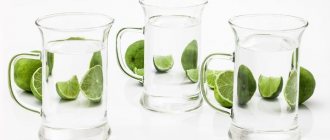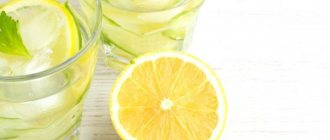The human body consists of 2/3 water, and even with the loss of only 2% of fluid, a person begins to feel extremely thirsty. However, the amount of liquid always depends on age, and the older the individual, the less water, so to speak, in him. For example, in infants the volume of water is 70-75% of body weight, in people under 50 years old - 60-65%, and in elderly people - 50-55%. By the way, according to experts, it is the deteriorating ability of body tissues to bind and retain water that is one of the main causes of aging. And it’s not for nothing that we are all taught from childhood to drink as much water as possible.
But drinking at random and drinking wisely are two different things, and it all depends on the details. Let's not talk about extraneous topics, but let's get straight to the main thing.
In lesson four we will cover the following questions:
- How much water should you drink per day?
- What are the consequences of decreasing or increasing the amount of water you drink?
- When to limit the amount of water you drink
- What exactly should you drink?
- Water substitutes
- How to drink correctly
- Daily drinking regimen
- Drinking regime for women
- Drinking regimen for hypertension and high cholesterol
- Drinking regime for active people
And we will begin with one of the most vital and practical issues.
How much water should you drink per day?
Despite the fact that hundreds of studies have been conducted on the topic of daily water intake, there is not yet one specific opinion. Some recommend drinking at least 2 liters of water per day, while others advise measuring the volume in glasses and drinking at least 8 glasses. There are also those who make calculations based on the proportions of 30 ml of water per 1 kg of weight. But, one way or another, no matter what option is adopted, the result is approximately 2-2.5 liters.
Here it should be pointed out that there is also a rather original opinion: you should drink as much water as you want, and there is no point in forcibly pouring liquid into yourself. Moreover, the lion's share of the necessary life-giving moisture enters the body along with food: tea, compotes, soups, etc., which fully satisfies the body's needs for water. We will not opt for any particular option, but use a little of everything.
When calculating the daily volume of water, you need to be guided not only by the recommended volumes, but also by the following factors:
- If a person is sick and/or takes medications, you need to drink more to remove toxins
- In the summer, you also need to drink more (not 30, but 40 ml per 1 kg of weight), because water is involved in the process of cooling the body
- Those engaged in active physical work and athletes need more water (50-60 ml per 1 kg of weight)
- Children need more water because... they are more active, which means the body uses more water
It would not be superfluous to note a few more situations when water intake should be increased:
- Smoking. Cigarette smoke “dries out” the mucous membranes of the throat and nose, as a result of which a person’s local immunity weakens. This increases the likelihood of contracting airborne diseases. In order for the hydration of the mucous membranes to be normal, smokers need to drink 60% more water per day than non-smokers.
- ARVI. During the process of illness, the body loses more moisture than usual, because... it comes out with sweat. In addition, water is involved in the formation of mucus with immune system cells that kill viruses. In case of ARVI, the volume of water should be increased by 50%.
- Lactation. Breast milk requires large amounts of water to form. Any nursing woman should increase the amount of water consumed per day by 50% if there is a lot of milk, and by 150% if there is little milk.
- Protein diet. Any diet for weight loss involves a lot of protein. If there is not enough water in the body, constipation may occur. Also, in the process of breakdown of fatty tissue, the number of toxins that must be eliminated from the body increases. With a protein diet, fluid intake should be increased by 30-50%.
- Heavy loads. People who play sports, lead an active lifestyle, and visit baths and saunas should increase their daily water intake by 30-100%.
- Sex. After sex, the body becomes dehydrated in much the same way as during fitness, so it is recommended to drink 1-2 additional glasses of water.
But “experiments” with the amount of water also have their own nuances. They do not cause serious harm (except in cases of acute water shortage), but they definitely need to be mentioned.
Why is it important to drink water
With a lack of water, the kidneys do not function at full capacity, because they do not have enough fluid to absorb from the blood, process, dissolve and remove with urine all substances toxic to the body. This causes urine to become more concentrated, which over time can lead to the formation of kidney stones.
If the kidneys perform their functions poorly, then higher demands are placed on the liver, which is also an organ that neutralizes harmful substances. Because of this, the liver cannot properly process fat obtained from food and accumulated in the body into energy. All this leads to stagnation, which contributes to the formation of stones. In addition, the liver ceases to actively participate in fat metabolism, lipids begin to accumulate in the body faster, and the person gains extra pounds.
That is why it is important to know how to drink water correctly and how much, because when there is a lack of water in the body, an emergency mode of water saving is activated. As a result, the following phenomena are observed.
On the one hand, the absorption of water from the feces in the intestines begins. This causes constipation.
On the other hand, the body tries to accumulate fluid by any means, depositing it in the intercellular space, and this leads to the appearance of edema.
Recommended articles on this topic:
- How to check water quality: independently and in the laboratory
- Drinking water at home: health comes first
- Is it possible to drink tap water, and what should you be wary of?
It should be understood that taking diuretics will help improve a person’s condition only for a short time, since they act on the effect, and not on the cause that caused the edema. And no matter how strange it may sound, the best method of getting rid of puffiness is to learn how to drink water correctly and start consuming it in sufficient quantities. As a result, the body will stop storing fluid and swelling will gradually subside.
According to WHO, more than 80% of all diseases that affect humanity are associated with a lack of water in the body.
Many experts believe that constant water deficiency - chronic dehydration - is the cause of the development of many diseases, such as hypertension, bronchial asthma, obesity, allergies, depression and a number of other psycho-emotional disorders.
A constant lack of water gradually leads to significant disturbances in the body. There is a decrease in performance, drowsiness, fatigue, digestive disorders, etc. A dehydrated body begins to conserve fluid and reduces the speed of biochemical processes, as a result, blood viscosity increases, which, in turn, leads to the formation of blood clots. Problems also begin with the central nervous system, because the human brain consists of 75% water. Therefore, when there is a lack of fluid, stress occurs in brain cells, leading to decreased concentration, attention and memory impairment.
What are the consequences of decreasing or increasing the amount of water you drink?
It is impossible to cause any critical damage by increasing the amount of liquid you drink. Firstly, the kidneys can pass up to 20 liters of water per day, and they simply “will not notice” 1-2 extra liters. And secondly, excess fluid will be removed along with natural secretions.
But a lack of water will be reflected almost instantly:
- Water deficiency of 1-2%: extreme thirst
- Water deficiency of 2-3%: disruption of digestive processes, anxiety, loss of performance
- Water deficiency by 4-5%: dizziness, headache, nausea, drowsiness, mood swings
- Water deficiency by 6-9%: impaired coordination of movements, impaired speech coherence
- Water deficiency of 10%: disruption of thermoregulation and cell death
- Water deficiency by 11-12%: disruption of biochemical processes
- Water deficiency more than 12%: worsening condition
- Water shortage of 20%: lethal
These facts have been established by scientists and confirmed by multiple studies. And they say that a person is simply obliged to monitor the flow of fluid into his body in proper quantities, and in no case allow a lack of water. Although, there are situations when limiting the amount of liquid you drink is not only possible, but also necessary.
Standards for everyone
When we talk about a sufficient amount of water, it is necessary to determine how much it will be in our usual measures. That is, how many glasses/liters of water should a person drink per day? For the average healthy adult with normal weight, the norm is 1.5-2 liters/6-8 glasses per day of clean water.
This does not include first course broths, milk, tea or coffee, compotes and juices. We are talking only about clean water. And it’s not that you need to drink these 1.5-2 liters at a time. To be healthy, you need to drink it correctly, distributing it evenly throughout the day.
What should those who are far from the average parameters do? Consumption rates can be calculated by weight and taking into account existing contraindications. This approach makes it possible to balance the benefits and harms of the liquid consumed.
The formula for calculating the required amount of water is quite simple - 30 ml of water per 1 kg of weight per day, that is, the formula itself looks like this:
Increasing physical activity requires increasing the amount of water you drink. Our body will need more of it after training, in hot climates, at high body temperatures, during colds, and breastfeeding. In these situations, it consumes liquid in much larger volumes. Losses must be replenished to maintain health.
The individual calculation is based not only on weight, but also takes into account age and occupation. A teenager, a man or a woman, a pensioner, a bodybuilder will need different amounts of water to meet the body's needs.
Careful adherence to the drinking regime is especially important for children and the elderly. Due to age-related characteristics, their body loses fluid faster and dehydration occurs faster.
Chronic diseases (diabetes, kidney disease, hypertension) require strict control over the drinking regime. If they are present, a mandatory consultation with a doctor and strict adherence to all recommendations are required (in each specific case they will be individual!).
When to limit the amount of water you drink
As a rule, cases when it is necessary to reduce the amount of water consumed are associated with certain diseases. There are a few of them:
- Phosphaturia, renal failure and other kidney diseases. The mechanism for removing fluid from the body is disrupted, and its excess can cause vascular overload.
- Hypertension. Drinking large quantities of water at once can cause a surge in blood pressure (despite this, you need to drink a lot to thin the blood and reduce pressure). By the way, hypertensive patients are advised to limit their consumption of table salt and eat more fruits and vegetables.
- Swelling of the limbs. Here everything should be decided individually in consultation with a specialist. If edema is caused by diseases of the endocrine system, kidneys and heart, the drinking regime must definitely be adjusted, and if the edema is exclusively physiological in nature, then reducing the amount of fluid drunk can aggravate the disease.
Be that as it may, the body of each individual person is unique, and therefore, in any case, it is necessary to contact doctors who can help determine the causes of a particular disease and develop a special drinking regimen.
But apart from the health problems listed above, drinking large amounts of water has only benefits. A lot of harmful substances enter the human body along with food, drinks and air, as a result of which the body becomes polluted, and this in turn becomes the cause of various diseases. Water, if it does not contain impurities, cleanses the body of toxins, waste and other debris, and we can safely say that water-drinkers do not cause any damage to themselves.
We also note that, firstly, plain water has no calories, secondly, if you drink it before meals, a person will eat less food, which is also very useful and prevents overeating, and thirdly, metabolic processes and fat burning thanks to water will go much faster. So 2.5-3 liters of water per day is very good.
Tips on how to drink water properly
How much water should you drink per day? There is no exact answer to this question. If you are not accustomed to consuming large volumes of liquid daily, then you should not force yourself to drink. The rate should be increased gradually, over at least two weeks. Remember the basic rules:
- The body can get water from drinks and food. Enrich your diet with fresh fruits and vegetables.
- Feel your body and don't force yourself into the standard 6-8 glasses of water a day. Each person's needs are individual.
- It is correct to drink water in its pure form, because it does not contain extra calories, sugars, salts and any other substances that can negatively affect health.
- If you are going for a walk, drink water at home. During physical activity, it is correct to drink water in small portions, otherwise sweating may increase, which means dehydration will occur faster.
- During air travel, try to drink as much as possible, because the air in the aircraft cabin is very dry due to high pressure. Therefore, it is necessary to consume enough water to avoid dehydration.
- In the summer, it is right to drink as much water as possible, since the body loses a significant amount of fluid in hot weather. In this regard, to maintain water balance, it is better to drink a lot of liquid, but you need to increase the daily norm gradually and carefully. How to drink water correctly in hot weather? Experts recommend adding 0.5 liters to the usual volume. It would be enough. If you drink even more, sweating may increase.
- You should not drink too cold water in hot weather, because due to a sharp temperature change, even people with strong immunity can get a sore throat.
- It is also necessary to increase the amount of liquid consumed during the heating season, because at this time the indoor air becomes very dry. You can also install a humidifier in your home.
So, what kind of water is right to drink? Its temperature should not be too high or too low. Cold weather can cause spasm of the vocal cords, loss of voice, and provoke a sore throat or cold. Although scientific research has proven that cool water accelerates metabolic processes, since the body has to expend energy to “heat” it. But drinking hot water is not very correct, because it can destroy tooth enamel and cause burns to the oral cavity and other parts of the digestive tract.
Also remember that liquid removes not only toxic, but also beneficial substances from the body. Therefore, it is important to monitor your diet; you must add fresh fruits, vegetables, and nuts to your diet. It will also be correct if you drink mineral water.
You may also be interested in: What water to drink for children: recommendations from experts
What exactly should you drink?
What is considered the best drink is another important question that needs to be considered. Naturally, the best option will always be clean water without gas. But, for example, the famous nutritionist and endocrinologist Natalya Fadeeva says that it is quite possible to drink bottled low-mineralized (up to 50 ml/l) water, because it is considered an excellent solvent. But water with a mineralization of 500 mg/l can be drunk only in limited quantities and with the permission of a doctor, because it's healing.
Approximately 1/3 of the daily water volume can be replenished with herbal teas and well-diluted vegetable juices. If a person is prone to profuse sweating, you need to add some greens or fresh berries to the water - they will help replenish the lack of microelements lost with sweat.
But coffee, milk, alcohol, carbonated drinks and juices cannot be considered drinks. Alcohol and coffee generally remove water from the body and increase dehydration (dehydration). To replenish lost fluid, a person should drink the same amount of water as they drink coffee and alcohol. As for sweet drinks and milk, the former sharply increase blood sugar, and the latter also adds extra calories.
The exceptional usefulness of water and the very small number of its substitutes are obvious facts, and it is best to opt for ordinary drinking water. But today you can increasingly find “unusual” water. The answer to the question: is it worth drinking it, you will find out in the next section.
What kind of water should you drink for weight loss?
Experts recommend drinking water at room temperature during weight loss, and not cold water, as many people like.
The latter weakly quenches thirst, reduces immunity and causes weakness, lethargy and drowsiness. Research has confirmed that the optimal drink for weight loss is pure water, not teas or juices - even freshly squeezed and fortified. Water can be bottled or filtered. But mineral is not recommended - it should be used for therapeutic and preventive purposes, and only after consultation with a specialist.
Water substitutes
“Fancy” water refers to oxygenated, coconut and structured water. What is it, and what is the “trick” of each type?
Oxygenated water
Oxygenated or, more simply put, water enriched with oxygen is distinguished by the fact that it transfers oxygen to the body’s cells much faster, which is why a person does not feel overworked for a long time, and fatigue goes away faster. The high oxygen content has a beneficial effect on brain function, recovery processes and the removal of toxic substances from the body.
Nutrition specialist and medical psychologist Elena Morozova says that oxygenated water is recommended for use by athletes, people leading an active lifestyle or engaged in heavy physical work, living in unfavorable environmental conditions, and regularly experiencing stress. Such water increases people's efficiency with less physical activity and helps them return to normal faster.
But the most beneficial is water that is enriched with naturally occurring oxygen obtained from mountain springs. Many companies use medical oxygen in the production of oxygenated water, pointing out its uniqueness and naturalness, but the content of useful oxygen in such water is extremely low, and already half an hour after opening the container there is practically nothing left of oxygen in the water.
Coconut water
Coconut water is a drink and a meal at the same time. It contains proteins and carbohydrates in some quantities, but most of all it contains microelements and vitamins. Coconut water has the same level of electrolytes as human blood plasma, which is why it is often called the “juice of life.”
Elena Morozova, mentioned above, claims that coconut water perfectly restores water balance and is an excellent drink in the heat. It is also suitable for athletes, especially good after tiring activities. But you need to keep in mind that when interacting with oxygen, it very quickly loses its nutritional and beneficial properties. You need to drink it immediately after opening the bottle (or coconut), and there is no point in leaving it in the refrigerator.
Structured water
It has been scientifically proven that water found in inanimate nature differs in its structure from water in living organisms. When water enters the human body, it is rearranged, which requires a lot of energy. To minimize energy costs, researchers have developed different options for structuring water.
Structured water, as soon as it appears in the body, is immediately included in metabolic activity, and, according to many doctors, has a very good effect on health. But let us cite the opinion of Elena Morozova: she points out that the effectiveness of this type of water has not yet been confirmed. Of course, experiments are being conducted, but no official data has yet been released to the general public.
It is also important that scientists argue about the length of time that structured water retains its structure after exposure to the body. Some physiologists believe that this period is not too long, and can range from several minutes to half an hour.
Thus, we found out that the best option for drinking is regular drinking, oxygenated and coconut water (we won’t say anything unequivocal about structured water). So take note of this and drink some water. But you also need to drink not anyhow, but correctly.
We tell you how to drink.
Why water helps you lose weight
Let's find out how the process of losing weight in the body generally occurs. When burned, fats release the energy necessary for all important functions in the human body, and endogenous water, which we do not need. When the body is constantly replenished with clean fluid, the endogenous liquid leaves, and in combination with the breakdown of fats, you can lose weight well. If we experience a lack of moisture, cells begin to absorb and retain endogenous water inside themselves. As a result, weight loss occurs slowly or not at all.
Daily requirement of the body
Most people believe that you need to drink 1.5-2 liters of fluid per day, but this opinion is wrong. The daily intake should be calculated based on a person’s weight: approximately 40 ml per 1 unit of body weight. So, at 65 kilograms you should consume about 2.6 liters . It is also important to consider the intensity of physical activity. If you play sports, moisture loss occurs faster, so you need to drink more water. An increased need for moisture is also observed in the hot season.
How to drink correctly
Any nutritionist will tell you that you need to drink water in small portions throughout the day. Nutritionist Natalya Grigorieva says that some people, remembering that they didn’t drink enough water, drink the daily amount at one time, especially often before bed. The result is bags under the eyes and a swollen face in the morning.
The best option would be to put a bottle of drinking water somewhere in a visible place so that you don’t forget to drink, and, in fact, drink a few sips from time to time. It is important not to forget to track the approximate amount of water you drink.
It is very useful to start the day with a glass of clean water. You should drink it half an hour before meals to get the digestive system up and running. By the way, it is recommended to drink a glass of water not only in the morning half an hour before breakfast, but generally 30 minutes before each meal. After eating (after 30-40 minutes), you should drink a glass of herbal tea to replenish your fluid supply. The last glass of water or tea should be drunk half an hour before bedtime.
There is no consensus on taking water during meals, but most nutritionists believe that this can be done in moderate doses. According to Elena Grigorieva, a large amount of liquid will lead to indigestion, but, for example, half a glass will simply compensate for the lack of saliva. While eating, you need to drink in small sips, and the entire available amount of water (half a glass) needs to be spread over the entire meal.
Now it’s time to move directly to the drinking regime, and first we will talk about the everyday drinking regime, i.e. about the drinking regime for all people.
Daily drinking regimen
So, different professionals offer different modes, but the most common is the following:
- Drink a glass of water half an hour before each meal
- Drink a glass of water an hour after each meal
- Drink half or a whole glass throughout the day, regardless of meals
Research is regularly conducted on the effectiveness of drinking regimes, and one of the most recent was conducted at Harvard University. The results showed that the above regime is quite suitable for any person.
Let us remind you that:
- The bulk of water is excreted from the body in the form of urine through the kidneys (about 1.5 l/day)
- Some of the water leaves the body with sweat (about 300-600 ml/day)
- The proportion of water exhaled through the lungs (about 400 ml/day)
- A little water comes out through the gastrointestinal tract (about 200 ml/day)
Hence the conclusion follows that in order to fully replace lost life-giving moisture, a person needs to drink at least 2-2.5 liters of water per day. But if you suddenly can’t handle 2.5 liters, you shouldn’t worry, because... water comes with food and is even formed inside the body itself (approximately 300-400 ml). So it’s quite possible to limit yourself to 1.5 liters of water per day, drink tea, eat soups, fruits and vegetables, and everything will be fine.
But, despite the fact that the above regime is suitable for everyone, women who are especially sensitive to the elasticity of their skin and care about prolonging their youth can be advised to have a slightly different option.
The relationship between water and weight loss
When losing weight and losing weight, water has the following effect on the body:
- regulation of optimal body temperature;
- removal and removal of decay products from the body and thorough cleaning;
- transportation of nutrients and elements, oxygen, glucose inside cells;
- Helps in natural hydration of skin and soft tissues;
- improving joint flexibility, strengthening muscles;
- regulation of the digestive system.
People weighing 50-70 kg should drink at least 2200 ml throughout the day. For people weighing over 100 kg, the norm is 3 liters per day. It is important to maintain the balance of fluid in the body so as not to harm your health or worsen your well-being.
Drinking regime for women
This regimen was developed by the US Academy of Anti-Aging Medicine and is as follows:
- 1-2 glasses of “living” water (that is, not tap water, but natural water; you can use filters for drinking water) in the morning immediately after waking up
- 1-1.5 liters of water throughout the day, no matter what
- 1 glass of water 30 minutes before each meal
- 1 glass of water during (even small sips) or 40 minutes after meals
- 0.5-1 glass of water or herbal tea every 2-3 hours
- 1 glass of water 30 minutes before going to bed
And one more piece of practical advice (for both women and men): thirst is a sure sign that the body is becoming dehydrated. It usually appears when the body loses 1-2% of the total amount of fluid, which is approximately 3-4 glasses. So, when you are thirsty, you should definitely replenish water, and under no circumstances resist the desire to drink.
How to drink water correctly during physical activity
If you are physically active and regularly exercise, then you need to prepare for training 2 hours before it starts. At this time, you need to drink a cup of unsweetened tea or a glass of natural freshly squeezed juice, and a few minutes before class you should take a few large sips of water.
During sports, the body itself will notify you that it lacks fluid. You will know when it's time to drink if your saliva becomes thick and your throat becomes dry. An unpleasant taste and odor may appear in your mouth. These symptoms indicate that the body is actively burning fat. Metabolic products are excreted by the kidneys in the urine, so you need to promote their normal functioning. During physical activity, it is correct to drink water in small quantities every 10–15 minutes.
And only after finishing your workout can you drink a whole glass of still water. Remember that during physical activity the body loses not only fluid, but also salts. Therefore, after playing sports, it is correct to drink mineral water. You can also rinse your mouth with lightly salted water.
During strength training, the body does not lose water as quickly or intensely as during cardio exercise. Therefore, you may not feel thirsty. In this case, it is important to focus on your feelings and drink when you want. You can, in principle, not drink water at all. But after finishing your strength training, you should still drink 1-2 glasses of liquid.
The correct way to drink water during physical activity is as follows:
- 2 hours before the start of training – 1–1.5 glasses;
- 10 minutes before exercise – 80–100 ml;
- during sports – 100–150 ml every 15–20 minutes;
- after training - a glass of water, after 15 minutes you can drink more if you have not completely quenched your thirst.
You may also be interested in: How to choose a water cooler: a detailed guide to action
Drinking regimen for hypertension and high cholesterol
Drinking water is already an excellent way to combat hypertension. But for greater efficiency, we can recommend the following scheme:
- 1 glass of mineral water in the morning on an empty stomach
- 1 glass of mineral water 15-20 minutes before each meal
- Do not drink 30-40 minutes after eating
- 1 glass of mineral water before going to bed
The drinking regimen for high cholesterol is approximately the same, but there is one additional condition: to unload the urinary and cardiovascular systems, you need to supplement the above regimen with 1.5 liters of drinking water per day. But for any illness, you should always consult your doctor about your drinking regime.
And, of course, we could not ignore people who play sports, lead an active lifestyle or undergo serious physical activity.
Reviews
Most women admit that drinking a warm drink 30-40 minutes before meals helps you lose weight.
However, the rate of weight loss in this case will be different. For example, some note that it took them more than one month.
How quickly the extra pounds go away depends on several factors:
- is there a parallel change in diet to a healthier one;
- How much water does a woman consume per day in general?
- what causes the presence of excess fat (overeating, metabolic disorders, diseases).
Some women indicate that the “water” diet caused them severe swelling. Typically, such situations arise if you overdo it with the amount of boiling water.
Swelling when drinking hot water can be associated with the presence of chronic diseases. Therefore, before you start losing weight, you should definitely consult a doctor and undergo the recommended examinations.
You can read more about your experience with hot water from the reviews here.
Drinking regime for active people
The presented drinking algorithm was developed by the American College of Sports Medicine. Its essence is this:
- 1-2 hours before training (or other physical activity), be sure to drink 400-600 ml of water, herbal or fruit tea
- During training (or other physical activity), drink 3-5 small sips of water every 15 minutes.
- At the end of a workout (or other physical activity), you need to drink an amount of water equal to the weight lost (if it is impossible to find out the lost weight, you should drink 0.5-1 liters of water)
And finally, a few more tips for those for whom the correct balance of water in the body is important.
Additional recommendations
It’s likely that the information below is already familiar to you, but it’s still worth giving a couple of useful recommendations:
- If you don’t feel thirsty during the day, you don’t need to forcefully drink a lot of water - it’s much healthier to take just a few sips for prevention.
- It is advisable for women to drink 1 liter of water more than men, because... their genitourinary system needs more thorough rinsing
- Drinking 5 or more glasses of water increases your chances of avoiding stroke by 41% and kidney and bladder stones by 23%.
- If you instill in your child the habit of drinking 8 or more glasses of water a day, his academic success will be much better
- People who drink 1.5-2 liters of water every day are 45% less likely to have gastrointestinal cancer and 50% less likely to have bladder cancer.
- For overweight people who feel hungry, it is better to drink a glass of water first, because... behind the feeling of hunger there may be a feeling of thirst
Water is one of the most wonderful means for maintaining health, vitality and good mood. Therefore, drink as much as possible, and try not to replace water with juices, sodas, coffee, milk and other drinks. If the question is: how to quench your thirst, the answer should always be the same - drink a glass or two of water (by the way, read this article about the benefits of water). We finish the lesson and continue the course.
The fifth and final lesson will introduce you to several nutritional regimens and diets, including the protein and Japanese diets, the Malysheva diet, the Dukan diet, a raw food diet and several others. After studying the fifth lesson, it will become much easier for you to organize a proper diet.
Test your knowledge
If you want to test your knowledge on the topic of this lesson, you can take a short test consisting of several questions. For each question, only 1 option can be correct. After you select one of the options, the system automatically moves on to the next question. The points you receive are affected by the correctness of your answers and the time spent on completion. Please note that the questions are different each time and the options are mixed.
Statistics Full screen
Kirill Nogales
← Vitamins and microelements Nutrition and diet →
